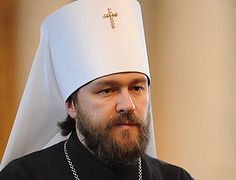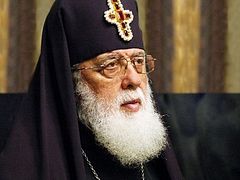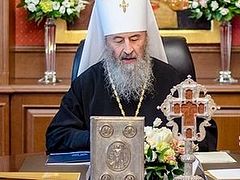Moscow, September 10, 2018
“What is happening now is a monologue of the Constantinople Patriarchate, and the Russian Orthodox Church’s efforts to prevent what may turn out to be irreparable are to no avail so far,” Vladimir Legoida, the head of the Moscow Patriarchate’s Synodal Department for Relations with Society and Media, said in an interview with the Rossiya-1 television channel today, reports TASS.
Legoida recalled that His All-Holiness Patriarch Bartholomew of Constantinople had received His Holiness Patriarch Kirill of Moscow in Constantinople on August 31 to discuss the issue of the possibility of granting a tomos of autocephaly to Ukrainian schismatics, but that previous dialogue “has yielded no results,” he said.
Now, the Patriarchate of Constantinople is plowing ahead with its plans to grant autocephaly to Ukrainian government-backed schismatics, having already appointed two exarchs in Kiev as a preparatory move, despite the protests and indignation of the canonical Ukrainian Orthodox Church, whose canonical territory is being disrespected, and of the Russian Orthodox Church.
The Russian Orthodox Church has announced that if the Ecumenical Patriarchate unilaterally grants autocephaly to the Ukrainian schismatics, it will break communion with Constantinople. Thus, the Ecumenical Patriarchate’s actions threaten the very Church unity of which it promotes itself as the guarantor.
This is not the first time that a refusal to listen to the Russian Church has led to problems for the Ecumenical Patriarchate. Leading up to summer 2016’s Cretan Council, which was intended to be a pan-Orthodox gathering with all autocephalous Orthodox Churches represented (except the Orthodox Church in America, whose autocephaly the Ecumenical Patriarchate refuses to acknowledge), three Local Churches pulled out for various reasons: the Antiochian, Bulgarian, and Georgian Patriarchates.
Given this situation, the Russian Orthodox Church proposed holding a special session before Crete in order to address those Churches’ issues and save the council. The Ecumenical Patriarchate, however, refused the Russian Church’s plea to save the council, and in the end, the Russian Church also pulled out.
Thus, the so-called “Great and Holy Council” represented less than half of the Orthodox world and has since been explicitly rejected by several Local Orthodox Churches.
Follow us on Facebook!




